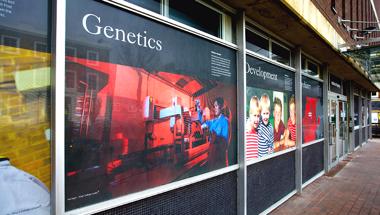Find a supervisor
Search through a list of available supervisors.

The Basic and Clinical Neuroscience department’s mission is to change the therapeutic options for people with neurological and psychiatric disorders and inspire the next generation of neuroscientists. Our vision is to link up fundamental biological research and clinical research to gain a better understanding of disease mechanisms, identify novel opportunities for intervention and test out new therapies. This will only be achieved through close collaboration of scientists and clinicians working on a common problem.
Our research explores the cellular and molecular basis of neurodegenerative and neurodevelopmental disorders including Alzheimer's disease, Parkinson's disease, Huntington's disease, motor neuron disease, schizophrenia, depression and autism spectrum disorder. We use human brain tissue, rodent and fly models, cells and patient-derived induced pluripotent stem cells to identify genes, proteins and signalling pathways implicated in the development of motor neuron disease, Alzheimer's disease and related dementias, with a view to developing novel disease-modifying therapies for the treatment of these diseases.
Our current research facilities have been greatly enhanced with the opening of the Maurice Wohl Clinical Neuroscience Institute, which provides cutting-edge technology for more than 200 Neuroscientists. The institute hosts the Wohl Cellular Imaging Centre, providing state-of-the art light microscopy equipment, image analysis software and workstation for neuroscience and biomedical research. We are driving research that will translate molecular discoveries made in the laboratory into therapies for our patients.
Key benefits
A list of recent publications can be viewed here.
The Department’s mission is to change the therapeutic options for people with Neurological and Psychiatric disorders and inspire the next generation of Neuroscientists. Our vision is to link up fundamental biological research and clinical research to gain a better understanding of disease mechanisms, identify novel opportunities for intervention and test out new therapies. This will only be achieved through close collaboration of Scientists and Clinicians working on a common problem.
The Department of Basic and Clinical Neuroscience sits within the Division of Neuroscience at the IoPPN. Related courses include:
UK Tuition Fees 2024/25
Full time tuition fees: £7,950 per year
Part time tuition fees: £3,975 per year
International Tuition Fees 2024/25
Full time tuition fees: £30,240 per year
Part time tuition fees: £15,120 per year
UK Tuition Fees 2025/26
Full time tuition fees: £8,500 per year
Part time tuition fees: £4,250 per year
International Tuition Fees 2025/26
Full time tuition fees: £32,400 per year
Part time tuition fees: £16,200 per year
These tuition fees may be subject to additional increases in subsequent years of study, in line with King's terms and conditions.

Home to the Institute of Psychiatry, Psychology & Neuroscience.
Graduate research students work closely with their supervisors and enjoy regular meetings to discuss their progress. They also liaise with other members of staff with relevant research interests and are encouraged to attend and participate in departmental research presentations and other Institute seminars. There is a full induction for new graduate students on commencing their studies. Each full-time graduate research student is allocated their own workspace and computer; facilities for part-time students can be arranged according to their needs. State-of-the-art genetics and neuroimaging facilities are available, and students benefit from a unique Clinical Research Facility, and the new Maurice Wohl Clinical Neuroscience building.
Training courses run by the department, the Institute or through the Graduate School can be utilised as required to provide training in a wide variety of topics, from transferable skills to academic areas directly relevant to the student's thesis.
Professor Peter Giese
Professor Sandrine Thuret
For any additional queries regarding application and project approval procedures please contact
Education Support Team: ioppn.pgr@kcl.ac.uk
Admissions Tutors: Alessio Vagnoni (primary) and Deb Pal - alessio.vagnoni@kcl.ac.uk, deb.pal@kcl.ac.uk
Senior Business Manager: Leanne Lu - leanne.lu@kcl.ac.uk
UK Tuition Fees 2024/25
Full time tuition fees: £7,950 per year
Part time tuition fees: £3,975 per year
International Tuition Fees 2024/25
Full time tuition fees: £30,240 per year
Part time tuition fees: £15,120 per year
UK Tuition Fees 2025/26
Full time tuition fees: £8,500 per year
Part time tuition fees: £4,250 per year
International Tuition Fees 2025/26
Full time tuition fees: £32,400 per year
Part time tuition fees: £16,200 per year
These tuition fees may be subject to additional increases in subsequent years of study, in line with King's terms and conditions.

Home to the Institute of Psychiatry, Psychology & Neuroscience.
Graduate research students work closely with their supervisors and enjoy regular meetings to discuss their progress. They also liaise with other members of staff with relevant research interests and are encouraged to attend and participate in departmental research presentations and other Institute seminars. There is a full induction for new graduate students on commencing their studies. Each full-time graduate research student is allocated their own workspace and computer; facilities for part-time students can be arranged according to their needs. State-of-the-art genetics and neuroimaging facilities are available, and students benefit from a unique Clinical Research Facility, and the new Maurice Wohl Clinical Neuroscience building.
Training courses run by the department, the Institute or through the Graduate School can be utilised as required to provide training in a wide variety of topics, from transferable skills to academic areas directly relevant to the student's thesis.
Professor Peter Giese
Professor Sandrine Thuret
For any additional queries regarding application and project approval procedures please contact
Education Support Team: ioppn.pgr@kcl.ac.uk
Admissions Tutors: Alessio Vagnoni (primary) and Deb Pal - alessio.vagnoni@kcl.ac.uk, deb.pal@kcl.ac.uk
Senior Business Manager: Leanne Lu - leanne.lu@kcl.ac.uk
Search through a list of available supervisors.
For any additional queries regarding application and project approval procedures please contact: Education Support Team: ioppn.pgr@kcl.ac.uk Admissions Tutors: Alessio Vagnoni (primary) and Deb Pal - alessio.vagnoni@kcl.ac.uk, deb.pal@kcl.ac.uk Senior Business Manager: Leanne Lu - leanne.lu@kcl.ac.uk
Discover your accommodation options and explore our residences.
Chat to current students and staff to find out about life at King's.
Want to know more about studying at King's? We're here to help.
King's is right in the heart of the capital.